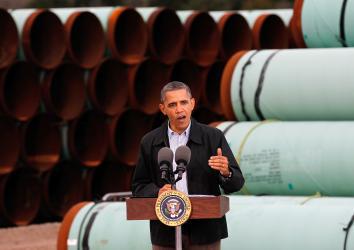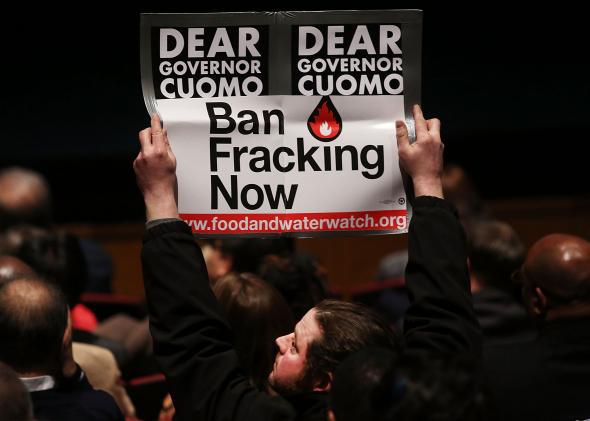New York will ban fracking, Gov. Andrew Cuomo’s administration announced Wednesday. “I cannot support high-volume hydraulic fracturing in the great state of New York,” said acting health commissioner Howard Zucker, according to the New York Times.
Cuomo had dithered for years on this decision, leaving in place a de facto moratorium on fracking in the state as he called for further study on the health risks. Wednesday’s announcement sparked an outpouring of glee from a vocal anti-fracking lobby that includes the likes of Robert F. Kennedy, Jr. and Mark Ruffalo.
Fracking—a method of extracting natural gas and oil from shale deposits—has driven a natural gas boom in the United States over the past decade. Because natural gas burns cleaner than coal, the boom has helped to cut the United States’ carbon emissions. But fracking comes with risks of its own, including potential health and safety threats, which depend in part on how carefully it is carried out.
So did Cuomo make the right call? He did, but not for the reasons he’d have you believe.
Cuomo has promised all along to base his fracking decisions on scientific evidence. But, as is often the case with controversial new technologies, the scientific evidence points in both directions. We know there are risks, benefits, and uncertainties. We just can’t agree on how to weigh them. That’s why, as Adam Briggle argued convincingly in Future Tense last year, the fracking debate cannot be settled by science alone. It can only be settled by appeals to values, priorities, and interests—which is to say, politics.
To understand Cuomo’s decision, then, you have to understand the political context. For years, he has been haunted at nearly every public appearance by anti-fracking protesters enraged by his waffling on the issue. But the moderate Democrat was reluctant to take an anti-fracking stand before his November re-election, lest Republicans seize on the issue to whittle away at his majority. (He ended up winning with 54 percent of the vote.) With the campaign behind him, Cuomo was finally free to make a decision that would get the anti-fracking crowd off his back.

Photo by Tom Pennington/Getty Images
A second factor may also have spurred him to action: The recent steep decline in oil prices has stifled demand for drilling and fracking, undercutting Republicans’ efforts to paint fracking as an economic imperative.
Cuomo insisted Wednesday that the fracking ban was the result of a bureaucratic, evidence-based process. “I don’t think I even have a role here,” he said in a news conference. Yeah, right—and Obama doesn’t have a role in the Keystone pipeline decision.
In fact, Obama’s pipeline quandary resembles Cuomo’s fracking dilemma in several respects, including his risk-averse handling of it. Politicians are often criticized for putting off tough decisions. But Cuomo’s fracking decision shows that procrastination can pay off, provided you act once the opportunity arises. Perhaps Obama, whose State Department has been “reviewing” Keystone XL for six years, will be the next to kill a controversial energy project. Why not strike while the oil is cheap?
Previously in Slate:
